
The Bottom Line
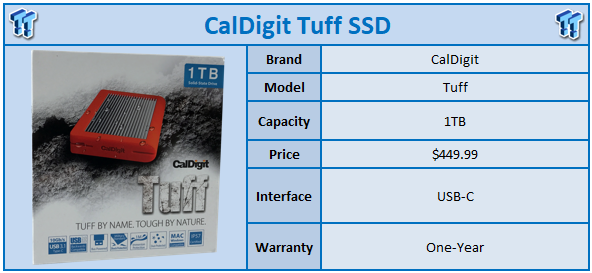
CalDigit recently joined the portable SSD market, bringing their Tuff lineup up to date with USB-C and a 1TB SSD model.
July 2016, we had a look at the 2TB Tuff USB-C model. Now, a year later, we are taking on the 1TB SSD that is the latest solution from CalDigit. This device still shares the same IP57 certified enclosure as the hard drive based solution but increases performance from 140 MB/s to 540 MB/s over Thunderbolt 3 and Gen 2 USB-C. interfaces.
For those on legacy USB 3.0, performance tops out at 430 MB/s. CalDigit offers the 1TB SSD version with a green silicon cover by default, but for an extra cost you can pick up a blue, black, silver, or orange cover to style your drive your way. Compatibility extends to both Windows and macOS computers with USB 3.0, USB-C or Thunderbolt 3 connectivity.
The MSRP for the CalDigit Tuff 1TB SSD comes in at $499.99 with a one-year warranty.
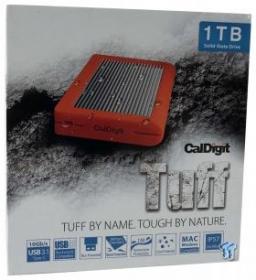
Packaging for the Tuff SSD carries capacity and drive information at the top right, with a good deal of marketing information below.

Full tech specs can be found on the spine of the device.
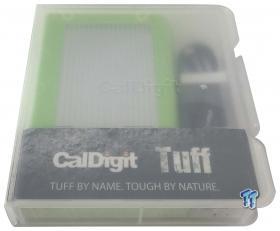
The Tuff SSD is supplied in the archive box, a staple of CalDigit storage solutions.
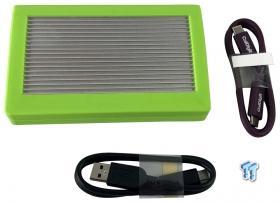
The scope of delivery includes the drive, USB-C cable in purple, and Type-C to C cable below.
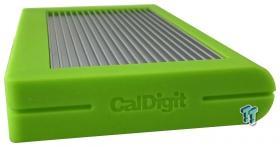
Subtle branding is placed on the silicon cover for the drive.
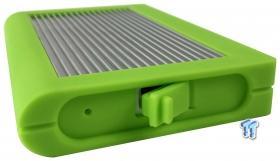
On the top side, we have the USB-C connection that is hidden behind the seal of the silicon cover.
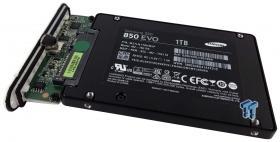
Internally, I was pleasantly surprised to see CalDigit using the 850 EVO from Samsung. While this is a nice 1TB capacity, the inclusion of the 850 EVO signals we could see a 2TB version in the future.
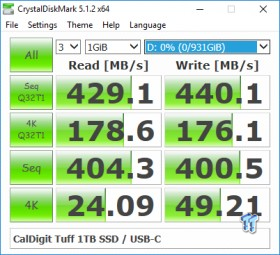
Testing the Tuff SSD, we reached 440 MB/s peak due to the Gen 1 nature of our USB-C port.
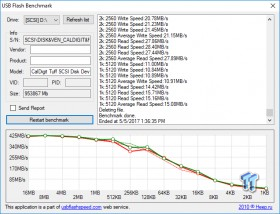
Similar performance was found with FBM, starting at 425 MB/s read and write. The Tuff held that performance from 16M to 1M before falling off slowly.
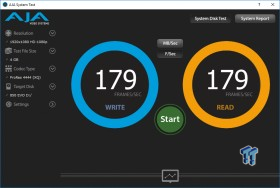
Using AJA, we reached 179FPS in the above 1080p test.
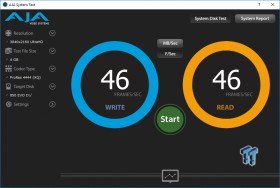
Moving to 4K, FPS dropped to 46. Using this device on a Gen 2 or Thunderbolt 3 port would be needed for full 60p 4K performance.
Like the HDD model I reviewed last year, I too enjoyed the build quality of the SSD solution today. Nothing has really changed here, except for a slight weight reduction moving from the HDD to SSD. Otherwise, we still have the IP57 certified enclosure and organic reliability due to the SSD. I was surprised to see the 850 EVO internally, but it's a solid move from CalDigit and one that could see expansion to a 2TB SSD model in the future quite easily.
The performance was on par with marketing, capping at 440 MB/s on our Gen 1 USB-C connection. I didn't think to try this solution on our Alienware 15s Thunderbolt 3 connection as that would have produced far better results. Nevertheless, the Tuff showed consistent performance in FBM hovering right around 425 MB/s down to 1M file size. AJA showed solid 1080p60 performance at 179 FPS, while reaching 46 FPS with 4K.
Overall, CalDigit is looking pretty good in this corner of the market. Its closest competitor is the LaCie Rugged series, and they have their 1TB SSD model priced $200 higher than the Tuff SSD, offering the same level of performance.
Tyler's Test System Specifications
- Motherboard: ASUS Maximus IX Hero (buy from Amazon)
- CPU: Intel Core i7 7700K (buy from Amazon) / (Read our Review)
- Memory: G.SKILL TridentZ DDR4 3200 (buy from Amazon)
- Video Card: EVGA GeForce GTX 1080 Hybrid (buy from Amazon)
- OS Storage: Intel 730 480GB SSD (buy from Amazon) / (Read our Review)
- Secondary Storage: MyDigitalSSD BP5 512GB SSD (buy from Amazon)
- Case: EVGA DG-86 (buy from Amazon)
- Power Supply: EVGA SuperNOVA 750 P2 (buy from Amazon)
- Networking: ASUS PCE-AC88 AC3100 (buy from Amazon)
- Networking: ASUS ROG 10G Express
- Networking: ASUS Thunderbolt EX3 (buy from Amazon)
- OS: Microsoft Windows 10 (buy from Amazon)

| Performance | 90% |
| Quality | 95% |
| Features | 90% |
| Value | 90% |
| Overall | 91% |
The Bottom Line: Although i'd like to see CalDigit offer a longer warranty on the Tuff lineup, there is no denying solid performance and durability in one package.
PRICING: You can find products similar to this one for sale below.
 United
States: Find other tech and computer products like this
over at Amazon.com
United
States: Find other tech and computer products like this
over at Amazon.com
 United
Kingdom: Find other tech and computer products like this
over at Amazon.co.uk
United
Kingdom: Find other tech and computer products like this
over at Amazon.co.uk
 Australia:
Find other tech and computer products like this over at Amazon.com.au
Australia:
Find other tech and computer products like this over at Amazon.com.au
 Canada:
Find other tech and computer products like this over at Amazon.ca
Canada:
Find other tech and computer products like this over at Amazon.ca
 Deutschland:
Finde andere Technik- und Computerprodukte wie dieses auf Amazon.de
Deutschland:
Finde andere Technik- und Computerprodukte wie dieses auf Amazon.de
Similar Content
Related Tags

